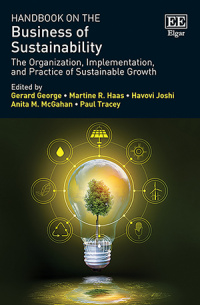Hardback
Handbook on Oil and International Relations
This Handbook provides an in-depth analysis of the multiple ways in which oil has shaped, changed and affected international relations and global politics. Theoretically innovative, it provides new insights into the interaction between the materiality of oil and its social, economic and political manifestations.
More Information
Critical Acclaim
Contributors
More Information
This Handbook provides an in-depth analysis of the multiple ways in which oil has shaped, changed and affected international relations and global politics. Theoretically innovative, it provides new insights into the interaction between the materiality of oil and its social, economic and political manifestations.
International contributors address the continuing legacy of oil, colonialism, and neo-imperialism and how this has had lasting effects on regions like the Middle East, Africa and Latin America. Chapters also assess the complex ways in which oil has influenced the trajectory of global capitalism with the emergence of multiple and powerful economic actors and institutions, and how this has affected the less powerful, the marginalised and the dispossessed. The Handbook concludes by considering the future of oil in the context of the transition to a low-carbon energy system and the challenges and geopolitical consequences of a world becoming less dependent on oil.
Exploring the interaction between oil, hegemony and the international political order, this Handbook will be critical reading for scholars and students of international relations, energy policy and environmental governance and regulation. It will also be beneficial for practitioners and policy makers in the field of the international political economy of energy.
International contributors address the continuing legacy of oil, colonialism, and neo-imperialism and how this has had lasting effects on regions like the Middle East, Africa and Latin America. Chapters also assess the complex ways in which oil has influenced the trajectory of global capitalism with the emergence of multiple and powerful economic actors and institutions, and how this has affected the less powerful, the marginalised and the dispossessed. The Handbook concludes by considering the future of oil in the context of the transition to a low-carbon energy system and the challenges and geopolitical consequences of a world becoming less dependent on oil.
Exploring the interaction between oil, hegemony and the international political order, this Handbook will be critical reading for scholars and students of international relations, energy policy and environmental governance and regulation. It will also be beneficial for practitioners and policy makers in the field of the international political economy of energy.
Critical Acclaim
罗丹伊特和奥斯托夫斯基已经成功ing together some of the world’s foremost experts on the global petroleum sector. Although the oil industry is to be phased out, it is still going to be around for a while and it is still big – so we still need to understand how it works.’
– Indra Overland, Norwegian Institute of International Affairs, Norway
– Indra Overland, Norwegian Institute of International Affairs, Norway
Contributors
Contributors include: Nathan Andrews, Margarita M. Balmaceda, Subhes C. Bhattacharyya, Gregory Brew, Gavin Bridge, Dag Harald Claes, Roland Dannreuther, Tim Di Muzio, Alexander Dodge, Betul Dogan-Akkas, Matt Dow, Aurora Ganz, Andreas Goldthau, Raymond Hinnebusch, Llewelyn Hughes, Peyman Jafari, Christopher Len, David Mares, Emily Meierding, Xiaoyi Mu, Lindsay Ofrias, Nelson Oppong, Wojciech Ostrowski, Kwabena Oteng Acheampong, Richard Sakwa, Suzana Sawyer, Caleb Wellum, Douglas A. Yates





